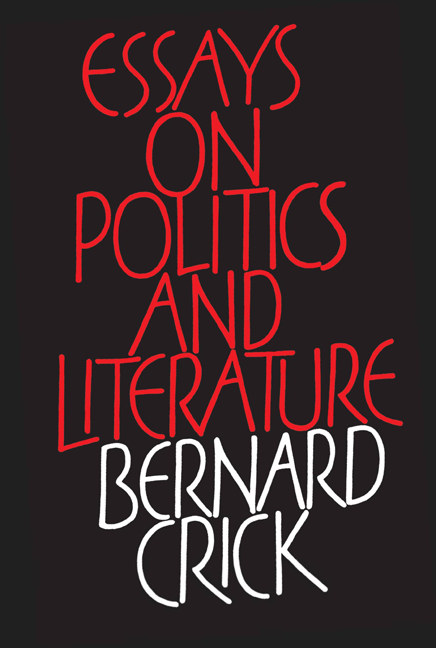Book contents
- Frontmatter
- Contents
- Preface
- Acknowledgements
- Foreword by David Daiches
- One Literature and Politics
- Two The Political in Britain’s Two National Theatres
- Three Young Writers of the Thirties
- Four Koestler’s Koestler
- Five Hannah Arendt: Hedgehog or Fox?
- Six Beatrice Webb as English Diarist
- Seven Words
- Eight My Lse
- Nine Reading The Observer as a Complex Text
- Ten On the Difficulties of Writing Biography and of Orwell’s in Particular
- Eleven Reading Nineteen Eighty-Four As Satire
- Twelve Animal Farm For Schools
- Thirteen Orwell and English Socialism
- Fourteen On the Orwell Trail
- Fifteen Wedekind’s Spring Awakening
- Sixteen Horvath’s Tales From the Vienna Woods
- Seventeen Pinter’s No Man's Land
- Eighteen Polly By Gaslight
- Nineteen Edgar Catches Jenkins’ Ear at the Barbican
- Twenty Barrault at the Barbican
- Index
Foreword by David Daiches
Published online by Cambridge University Press: 24 September 2020
- Frontmatter
- Contents
- Preface
- Acknowledgements
- Foreword by David Daiches
- One Literature and Politics
- Two The Political in Britain’s Two National Theatres
- Three Young Writers of the Thirties
- Four Koestler’s Koestler
- Five Hannah Arendt: Hedgehog or Fox?
- Six Beatrice Webb as English Diarist
- Seven Words
- Eight My Lse
- Nine Reading The Observer as a Complex Text
- Ten On the Difficulties of Writing Biography and of Orwell’s in Particular
- Eleven Reading Nineteen Eighty-Four As Satire
- Twelve Animal Farm For Schools
- Thirteen Orwell and English Socialism
- Fourteen On the Orwell Trail
- Fifteen Wedekind’s Spring Awakening
- Sixteen Horvath’s Tales From the Vienna Woods
- Seventeen Pinter’s No Man's Land
- Eighteen Polly By Gaslight
- Nineteen Edgar Catches Jenkins’ Ear at the Barbican
- Twenty Barrault at the Barbican
- Index
Summary
What attracts me most in Bernard Crick's essays is the speaking voice. In an age when academics write more and more for fellow specialists in a de-natured professional jargon, it is refreshing to find an academic (even a retired one) using the English language with unostentatious elegance to discuss, present, argue or meditate. These essays show a combination of humane intelligence, wide-ranging curiosity and precise knowledge in a variety of fields. They also show wit and humour and a rather appealing kind of wry egotism which manages to parade the self without glorifying it. And most of all, they show an ability to cross the boundaries set artificially by the rigidities of our academic structure. (I might add, in the Crickean vein of personal interpolation, that we invented a new curriculum-structure at the University of Sussex in 1961 precisely in order to remove those rigidities and make this kind of discourse more possible.)
Professor Crick is of course known as the biographer of George Orwell, and his sympathetic understanding of that remarkable writer shows through in much of his writing on other subjects as well as in the five illuminating essays on Orwell that form a central part of this book. He shares Orwell's feeling for unpretentious lucidity in his use of English as well as his general approach to politics and society. But the tone of reasoned argument is his own. One can disagree with some of the points he makes—as indeed I do—without feeling outraged or bullied, for this is a man voicing considered but sometimes tentative views in a conversational manner, almost tempting us to reply (as F.R. Leavis said one critic's reply to another ought to be, though it was something he never put into practice himself) with a ‘Yes, but—’.
The intelligent general reader, if such a person is not an invention of reviewers, will relish this book. It entertains as well as informs (and provokes). This surely is a primary function of the essay, a literary form which is here given new life.
- Type
- Chapter
- Information
- Essays on Politics and Literature , pp. ix - xPublisher: Edinburgh University PressPrint publication year: 2020



